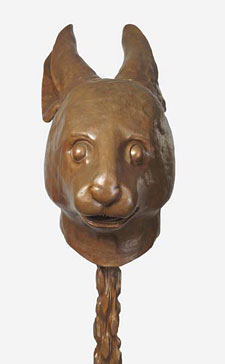Princeton University of Art Unveils Monumental Bronze Sculptures by Ai Weiwei
 In Circle of Animals/Zodiac Heads, Mr. Ai draws inspiration from sculptures that once adorned the fountain clock at Yuanming Yuan, an imperial retreat outside Beijing.
In Circle of Animals/Zodiac Heads, Mr. Ai draws inspiration from sculptures that once adorned the fountain clock at Yuanming Yuan, an imperial retreat outside Beijing.Photograph courtesy of The Princeton University Art Museum
The Princeton University Art Museum announced that it has installed 12 monumental sculptures by the renowned contemporary Chinese artist, architectural designer, curator and social activist Ai Weiwei at the University's Scudder Plaza, on view through Aug. 1 of 2013. The exhibit is part of a world tour of Weiwei's work, which has appeared in Sao Paulo, London, Los Angeles and Taipei.
Weiwei is one of China's most prolific and controversial artists. His work in recent years has included collaboration on the design of the Beijing Olympic Stadium, or "Bird's Nest," for the 2008 Olympic Games; Sunflower Seeds, an exhibition at London's Tate Modern featuring 100 million hand-painted porcelain seeds; and innovative uses of social media to advance artistic objectives, free speech and human rights.
In Circle of Animals/Zodiac Heads, Weiwei draws inspiration from sculptures that once adorned the fountain clock at Yuanming Yuan, an imperial retreat outside Beijing, representing the signs of the zodiac (snake, horse, ram, monkey, rooster, dog, pig, rat, ox, tiger, rabbit and dragon). Designed by Italian artist Giuseppe Castiglione in the mid-18th century, the original works were looted in 1860 when France and Britain invaded China. Of the 12 figures, only seven are known to have survived. Five have been repatriated to China, but ownership of the remaining two remains contested. Mr. Ai's re-envisioning of the work represents an intriguing intersection of history and politics and is a reflection on the complexities of authenticity and derivation.
This presentation of Circle of Animals/Zodiac Heads reflects a longstanding commitment on the part of the Woodrow Wilson School to engagement with human rights issues around the world, as well as the Art Museum's commitment to placing art across the whole of the University campus, thus creating rich opportunities to discover great art in the path of everyday life.
Notes James Steward, director of the Princeton University Art Museum, "We are delighted to have Ai Weiwei's work on campus for the coming year, work that is at once playful and provocative, and through which we can consider the role of the visual arts in the politics of resistance."
Resources:
Also in this Issue:
- Continuing the Copper Legacy of Roycroft
- Bringing New Life to Early Culinary Copper
- The Lure of Curiously Historic Coins Minted from Copper
- Copperton Lane: Specializing in Antique to Mid-Century Copper Items
- Princeton University of Art Unveils Monumental Bronze Sculptures by Ai Weiwei
